The International Day for the Elimination of Violence against Women , celebrated on 25 November, is a key moment to raise awareness on a vitally important issue. The European Union (EU) has been actively engaged in the fight against gender-based violence, a challenge that deeply affects human rights and gender equality.
Violence against women is one of the most widespread and systematic human rights violations worldwide, including in the European Union. It is a problem that affects every social strata, with a sad statistic that one in three women has experienced physical or sexual violence. This article will provide European People readers with an overview of how the European Union is addressing this crucial challenge and what progress has been made so far.
EU Initiatives: The Proposal for a Directive on Gender-Based Violence
The EU adopts a range of legislative and policy instruments to combat violence against women. These include directives, regulations and decisions, all aimed at protecting women from all forms of violence and promoting gender equality.
One of the key initiatives in this area is the proposed Directive on Gender-Based Violence. This ambitious initiative aims to establish common rules to criminalise the most serious forms of violence against women in all EU Member States. The new rules proposed by the Directive outline a number of crimes that are crucial to addressing the different forms of violence against women. These include female genital mutilation and the growing threat of online violence, including stalking and cyber harassment, non-consensual sharing of intimate or manipulated material, and incitement to hatred or violence online.
But this directive is not just about punishing perpetrators; it also guarantees victims of gender-based violence access to justice, the right to seek compensation, and access to free helplines and rape crisis centers. Victims will no longer be alone in their struggle, but will have the support and protection they deserve.
The Istanbul Convention
On 1 October, the Council of Europe Convention on preventing and combating violence against women and domestic violence (CETS No. 210) (Istanbul Convention) entered into force for the European Union, which became the 38th Party to the Convention.
The Convention is the first legally binding instrument at international level for a comprehensive normative framework aimed at protecting women from all forms of violence. Composed of a preamble, 81 articles divided into 12 chapters and an annex, it is a milestone in the fight against gender violence, provided that it is accompanied by a cultural evolution in society.
The aim of the Convention is to "promote changes in the socio-cultural behaviour of women and men, in order to eliminate prejudices, customs, traditions and any other practices based on the idea of the inferiority of women or on stereotyped models of the roles of women and men".
The EU's Financial and Research Commitment
In addition, the European Union is actively engaged in providing funding and support to specific programmes aimed at preventing violence against women, supporting victims and promoting gender equality. These programmes are essential to building a more equal and safer society.
Through the Citizens, Equality, Rights and Values programme, the EU provides funding to organisations working on projects aimed at combating gender-based violence.
At the same time, it facilitates the search for common solutions among member countries by organizing exchanges of good practices in the field of gender equality, helping to create a united front against this widespread phenomenon.
Another key element is the support provided to research on gender-based violence. For example, the EU has commissioned specific studies investigating the configuration of gender-based violence as a crime against women in EU countries and the assessment of the costs of gender-based violence in the European Union.
What is the International Day for the Elimination of Violence against Women?
Despite the EU's commitment, the fight against violence against women in Europe faces several challenges. The prevalence of such acts and persistent gender inequality require stronger action and greater awareness. However, there are signs of progress with increased awareness and stronger legislation in many member countries.
The International Day for the Elimination of Violence against Women serves as a reminder of the importance of continuing the fight against this grave violation of human rights. Through its policies and initiatives, the EU plays a key role in promoting safety and equality for women. It is essential to stay informed and engaged in this cause, awaiting further developments and working together for a more equitable and safe future for all.
European People is committed to remain a strong advocate for the fight against violence against women and to promote a society based on gender equality. Our aim is not only to inform, but also to raise awareness and inspire concrete actions to combat this form of human rights violation.



